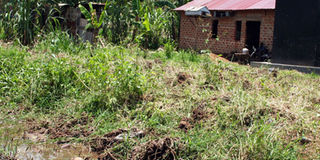Authorities to arrest wetland encroachers

Illegal. One of the houses that have been constructed in a wetland in Adjumani Town. PHOTO BY FELIX WAROM OKELLO.
What you need to know:
- Destroyed. Some of gazetted wetlands have been encroached on by residents who have turned them into farmlands.
Adjumani.
The Adjumani District authorities have resolved to arrest wetland encroachers in order to protect the natural resources.
Some of gazetted wetlands have been encroached on as residents turn them into farmlands and homes.
The Adjumani District natural resource officer, Mr Charles Giyaya, said during a press briefing early this week that there are many illegal structures in the wetlands.
“We shall start arresting the wetland encroachers because we need them [wetlands] protected,” he said.
Mr Giyaya said the National Environment Act 1995 stipulates that no one owns a wetland but the wetlands are held in trust by the government, adding that no one has been granted permission to occupy a wetland in Adjumani District.
He, however, explained that the National Environment Act permits traditional and environmental friendly activities such as fishing, gathering materials for crafts, water collection, among others, but it outlaws sand mining.
The Adjumani Town Clerk, Mr Samuel Lagu, denied claims that his office has been approving building plans for construction in wetlands, arguing that such instructions could have been issued in error and will be revoked and such buildings shall be demolished.
The main wetlands in Adjumani Town are Surumu, Minia, Iniangwa, Forua, Dramwisi but they have been greatly encroached, and degraded to near depletion.
The pressure for acquisitions of land for commercial and residential buildings is mounting in Adjumani Town as the town council is elevated to a municipality status.
The law
The National Environment Act 1995 CAP 153 stipulates that any person who commits an offence against the provisions of the Act or Statutory instruments’ upon conviction is liable to a term of imprisonment of not less than three months or a fine ranging from Shs30,000 to Shs3 million or both.



